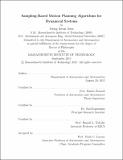Sampling-based motion planning algorithms for dynamical systems
Author(s)
Jeon, Jeong hwan, Ph. D. Massachusetts Institute of Technology
DownloadFull printable version (2.285Mb)
Other Contributors
Massachusetts Institute of Technology. Department of Aeronautics and Astronautics.
Advisor
Emilio Frazzoli.
Terms of use
Metadata
Show full item recordAbstract
Dynamical systems bring further challenges to the problem of motion planning, by additionally complicating the computation of collision-free paths with collision-free dynamic motions. This dissertation proposes efficient approaches for the optimal sampling-based motion planning algorithms, with a strong emphasis on the accommodation of realistic dynamical systems as the subject of motion planning. The main contribution of the dissertation is twofold: advances in general framework for asymptotically-optimal sampling-based algorithms, and the development of fast algorithmic components for certain classes of dynamical systems. The first part of the dissertation begins with key ideas from a number of recent sampling-based algorithms toward fast convergence rates. We reinterpret the ideas in the context of incremental algorithms, and integrate the key ingredients within the strict [omicron](log n) complexity per iteration, which we refer to as the enhanced RRT* algorithm. Subsequently, Goal-Rooted Feedback Motion Trees (GR-FMTs) are presented as an adaptation of sampling-based algorithms into the context of asymptotically-optimal feedback motion planning or replanning. Last but not least, we propose a loop of collective operations, or an efficient loop with cost-informed operations, which minimizes the exposure to the main challenges incurred by dynamical systems, i.e., steering problems or Two-Point Boundary Value Problems (TPBVPs). The second main part of the dissertation directly deals with the steering problems for three categories of dynamical systems. First, we propose a numerical TPBVP method for a general class of dynamical systems, including time-optimal off-road vehicle maneuvers as the main example. Second, we propose a semi-analytic TPBVP approach for differentially flat systems or partially flat systems, by which the computation of vehicle maneuvers is expedited and the capability to handle extreme scenarios is greatly enhanced. Third, we propose an efficient TPBVP algorithm for controllable linear systems, based on the computation of small-sized linear or quadratic programming problems in a progressive and incremental manner. Overall, the main contribution in this dissertation realizes the outcome of anytime algorithms for optimal motion planning problems. An initial solution is obtained within a small time, and the solution is further improved toward the optimal one. To our best knowledge from both simulation results and algorithm analyses, the proposed algorithms supposedly outperform or run at least as fast as other state-of-the-art sampling-based algorithms.
Description
Thesis: Ph. D., Massachusetts Institute of Technology, Department of Aeronautics and Astronautics, 2015. This electronic version was submitted by the student author. The certified thesis is available in the Institute Archives and Special Collections. Cataloged from student-submitted PDF version of thesis. Includes bibliographical references (pages 133-143).
Date issued
2015Department
Massachusetts Institute of Technology. Department of Aeronautics and AstronauticsPublisher
Massachusetts Institute of Technology
Keywords
Aeronautics and Astronautics.